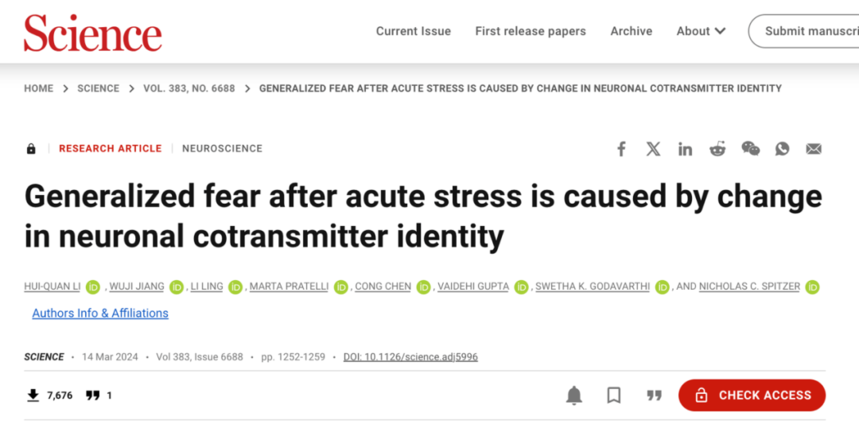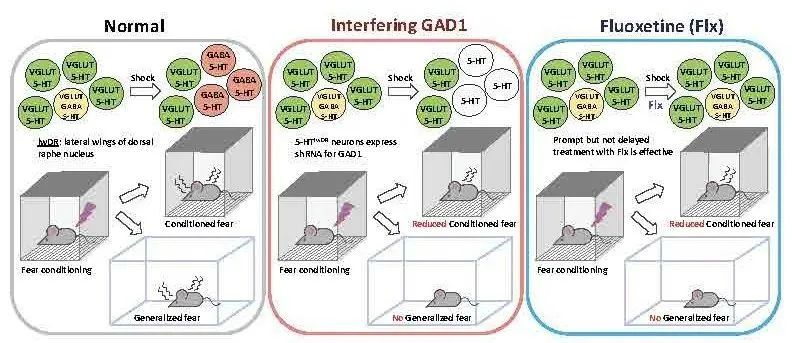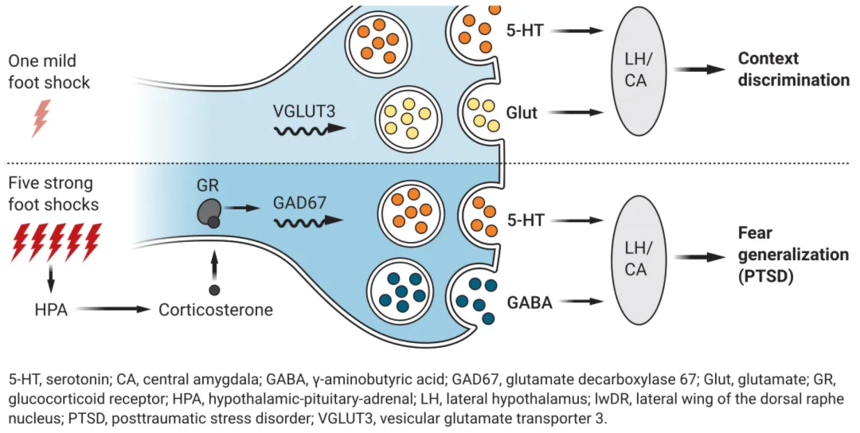Please click the button below to go to our email login page
|
Published in Science after 6 years of painstaking effort!Our nervous system can naturally perceive fear, but if fear (generalized fear) arises without actual threat, psychological harm may be developed, possibly resulting in long-term mental illness, such as post-traumatic stress disorder (PTSD).
On March 15, 2024, Huiquan Li, an assistant project scientist at the University of California, San Diego, and her former postdoctoral supervisor and academician of the American Academy of Sciences, Nicholas C. Spitzer published their research achievements regarding generalized fear of PTSD on Science, which successfully unveiled the stress-induced mechanisms involved in fear generalization without threat.
“Crash” in research, “turn off” rapidly
In 2017, the group of Huiquan Li started the research on depression.
However, in a small talk, Huiquan Li found her research was consistent with that of colleagues. To avoid waste of research resources, the group of Huiquan Li changed the research target to PTSD patients.
As the research progressed deeply, they found the core of PTSD is not conditioned fear, but the generation of generalized fear.
Accordingly, they established model mice with generalized fear similar to PTSD through induction of electric shock, and then discovered that in the state of generalized fear, the neurotransmitter released by dorsal raphe nucleus of mice changed. Their research revealed that the upward and downward mechanisms of the neural circuits that produce generalized fear, which is a brand-new discovery for PTSD research.
The more challenging, the more “addictive”
To verify this mechanism in the human brain, Huiquan Li began to face new challenges.
There are remarkable differences between mouse and human brains. Hence, they spent half a year to optimize experimental methods and ultimately confirmed the rationality of research methods in human brains. After half a year, the brain tissues donated by six departed PTSD patients and six control human brains were sent to the laboratory.
The ultimate experimental results indicated that PTSD patients also exhibit similar neurotransmitter changes in the corresponding brain regions of homogeneous neurons.
After clarifying the pathogenesis of PTSD, Huiquan Li began to ponder whether existing clinical drugs can prevent the changes of this neurotransmitter, thereby suppressing the generation of generalized fear.
“Through research and trials, we found fluoxetine can prevent changes in neurotransmitters and the development of fear generalization in mice, but this drug needs to be taken in the golden window period, and the earlier treatment can bring about better outcomes”, said Huiquan Li.
In July 2023, Huiquan Li submitted the research results of this six-year project to Science. At the end of October, the paper was published.
Despite the hard times, Huiquan Li thought conducting research gives people an irresistible sense of “addiction” .
Passion can overcome any difficulties
Huiquan Li received her bachelor’s degree in biotechnology from Zhejiang University. During a visit to the Institute of Neuroscience, Chinese Academy of Sciences, she became interested in neuroscience.
After graduation, she joined the research group led by Shumin Duan, an academician of the Chinese Academy of Sciences and a researcher at the Institute of Neuroscience of the Chinese Academy of Sciences, to pursue a doctoral degree. Huiquan Li thought the academician Shumin Duan is humble and objective with a sense of relaxation in scientific research, and this relaxation is indeed the purity for scientific research.
In 2014, Huiquan Li started her post-doctoral research at the University of California, San Diego, and continued neuroscience research.
Huiquan Li said that no matter where she is in the future, her scientific research direction and purpose remain consistent: focusing on the development and clinical application of drugs targeting nervous system. |




